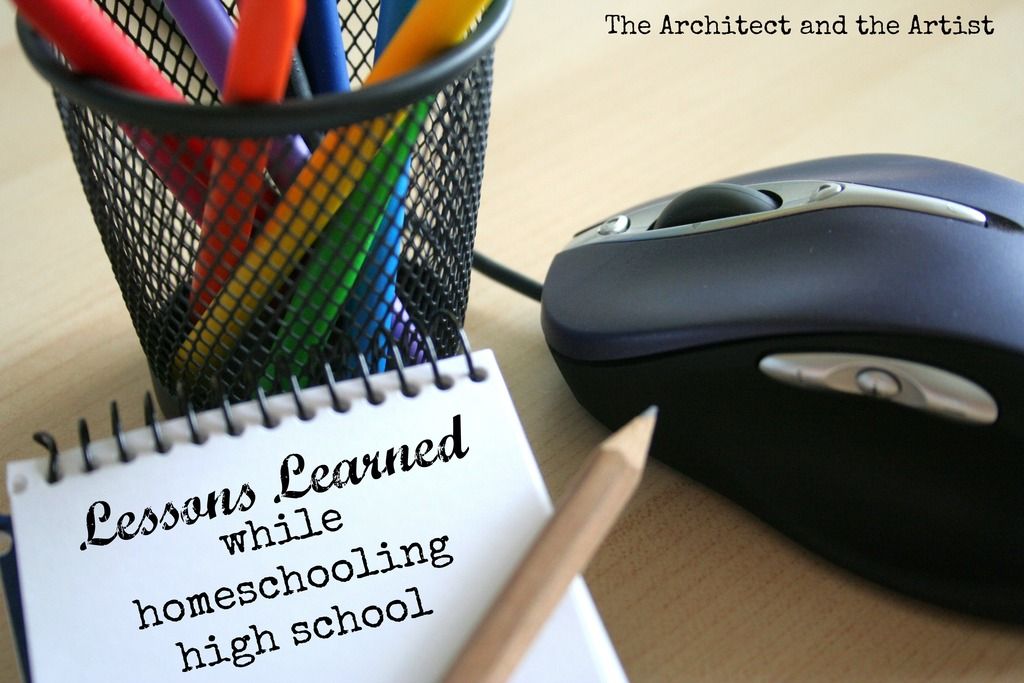{Affiliate links used.}
This past May my son walked across the stage as we waited at the other end to give him his diploma. A bittersweet moment. I was excited for him, but also sad that this phase of life for him is over. He will move on as an adult and those things we taught him go with him. Those failures we had as parents will also follow him. As I hand a diploma to one son I will soon turn around in August and start high school all over again with our youngest son. So many lessons came my way as I helped our oldest through high school. Now is the time to evaluate what worked and what didn't before we launch into high school again.
Read more about high school. Even though I am a certified high school teacher and taught seven years in a local high school, I knew I needed to read up more on homeschooling my boys through the teen years. The two books I read through before starting high school with my oldest were The Ultimate Guide to Homeschooling Teens and Senior High: A Home-Designed Form+U+La
and Senior High: A Home-Designed Form+U+La . The first book gives all kinds of advice on many different subjects like learning styles in teens, coursework, distance learning, and record keeping. The second book is more technical in nature and helped me lay out a four year plan for my son. There are also a plethora of forms in the book to help with planning. This summer I am hoping to re-read parts of these books as I know I have forgotten many of the ideas in them.
. The first book gives all kinds of advice on many different subjects like learning styles in teens, coursework, distance learning, and record keeping. The second book is more technical in nature and helped me lay out a four year plan for my son. There are also a plethora of forms in the book to help with planning. This summer I am hoping to re-read parts of these books as I know I have forgotten many of the ideas in them.
Slow down. My personality is one in which I love getting my to-do list done and moving on. I speed through things. The speed method of teaching tends not to work, and I have learned that I need to slow down. For example, when my youngest son doesn't get an algebraic concept the first time around I am now insisting we go back and slowly work through the concept again. When it comes to literature I found it was more valuable to pick a few good novels {like two or three} for the semester and really dig into them instead of racing through a bunch of books.
Discuss more. Towards the end of my oldest high school career I began to see how well he responded to discussion. Whether it was a literature selection or a Biblical concept, discussion seemed to work when writing fell short. Now, don't get me wrong. Writing is integral to learning. Students need to be decent writers by the time high school is done, but I found that discussion helped us get to the heart of the matter and the lessons were more internalized if we verbally processed the information first and had my son write after our conversation. By the last semester of high school, my son was taking only college courses {that counted for dual credit: high school and college}. There were many times he needed us to talk through his papers with him before he could write them. Discussion is also extremely useful when teaching your teen about life in general. It is a great way to transmit your values. If you are a Christian homeschooler, here is an article I wrote for Future Flying Saucers that talks about using discussion in order to help your teen apply God's Word.
Let go and let them be themselves. Sometimes our kids are our opposites. Every thing they do goes counter to how we would handle life. The teen years are a time of letting go and handing over some control {within reason} to your child. Letting them make some decisions on how to manage their time while studying or letting them choose subjects that truly interest them helps create a better environment for learning. You may not always like how they go about the learning process, but realize your teen may be different from you in how they learn. Teach them to run with their strengths and to manage their weaknesses so they don't impede their learning.
Look at the big picture. Anytime I work with my boys during their lessons I try to remind myself there is always a bigger picture. For example, working on algebra isn't just about algebra, but also about paying attention to details or learning to follow through. Writing a composition is more than writing. It is learning how to communicate. It is about learning to organize your thoughts. Playing a sport is more than learning the skills. It is teamwork. It is learning the value of life-long fitness. Realize that as your teach your teen there are hidden lessons happening at all times.
Need some more resources for teaching teens?



No comments:
Post a Comment